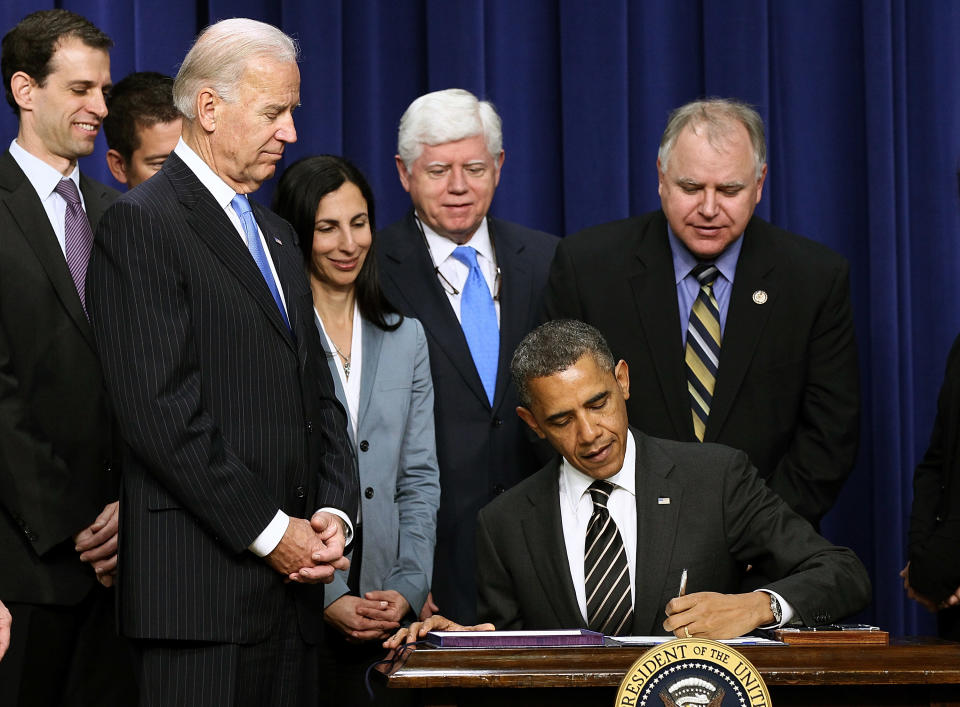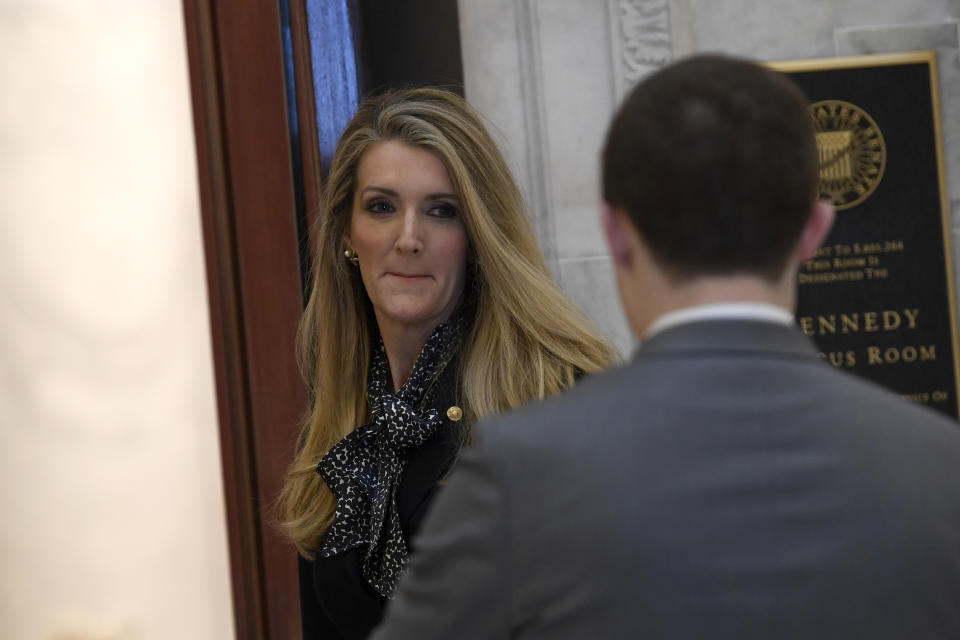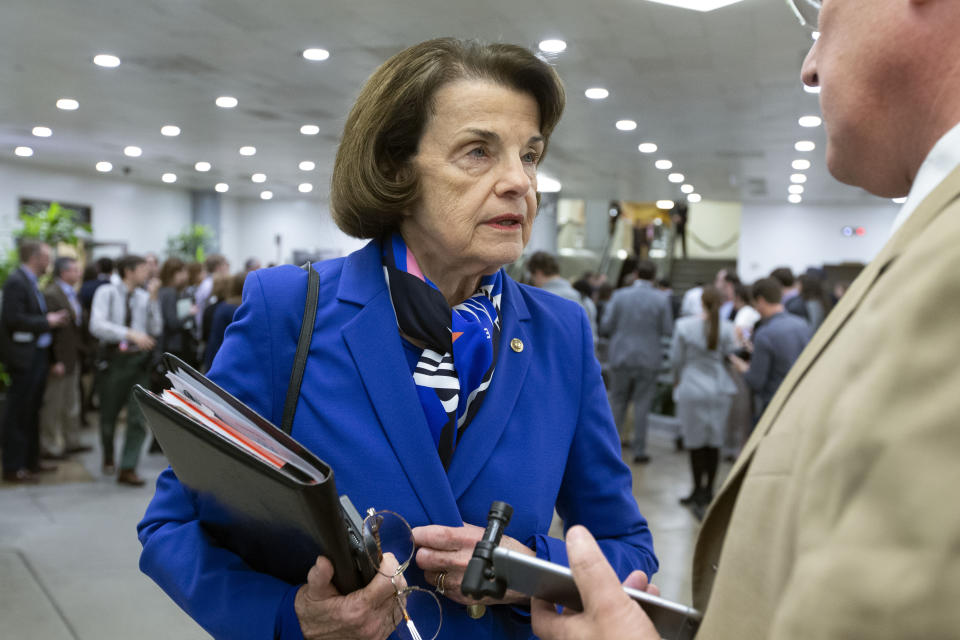Congress insider trading inquiry looks 'particularly damning' for Senator Burr, expert says
Sen. Richard Burr (R-NC) found himself mired in controversy after an investigation by ProPublica/The Center for Responsive Politics revealed that he and his wife sold numerous stock shares following confidential briefings on the coronavirus pandemic.
The Justice Department announced in March that it would be investigating some senators to determine whether they traded ahead of the stock market crash triggered by the coronavirus pandemic.
And one senator in particular could be especially vulnerable: Senate Intelligence Committee Chairman Burr.

“Insider trading cases, because they require knowledge of the material nonpublic information, are always established circumstantially,” James Cox, professor of corporate and securities law at Duke University, told Yahoo Finance. “It’s a little bit like the question in Watergate: ‘What did you know and when did you know it?’ And then putting that in proximity of when you traded.”
Cox added that “Burr’s been fairly open about [the fact] that we did have this intelligence briefing. We do know that was much richer than the information that was in the public domain. So we have those pieces about what he knew. And then you put that in relatively close proximity to when he knew that information and when he traded, that is particularly damning for him.”
When asked for comment, Burr’s office referred to the statement that the senator posted on Twitter.
My statement in response to reports about recent financial disclosures: pic.twitter.com/J4kye5a4ok
— Richard Burr (@SenatorBurr) March 20, 2020
‘It wasn’t just one or two stocks’
Back on Feb. 13, Burr and his wife sold shares of companies worth $1.7 million. According to an analysis by the Wall Street Journal, those shares were worth at least $250,000 less at the close of the trading day on March 19.
“The other thing that’s particularly damning about him is that the trades that he did engage in were significant,” Cox said. “It wasn’t just one or two stocks. It was a big part of his portfolio and an important component of his overall wealth, which suggests again that it was likely he was selling because he was fearful in light of what he had heard from the intelligence community — that there was going to be a major decline in the stock market.”
Burr was receiving daily coronavirus briefings around the time of his stock selling, which included several hotel companies. The hotel industry has been hit hard by the coronavirus.

In a Feb. 7 op-ed for Fox News, Burr and Sen. Lamar Alexander wrote that “the United States is better prepared than ever before to face emerging public health threats, like the coronavirus.”
But, according to NPR, he told a private group only a few weeks later that the coronavirus “is much more aggressive in its transmission than anything that we have seen in recent history. It is probably more akin to the 1918 pandemic.”
‘The information doesn’t have to emanate from a traditional insider’
Insider trading is defined by the Securities & Exchanges Commission (SEC) as “buying or selling a security, in breach of a fiduciary duty or other relationship of trust and confidence, while in possession of material, nonpublic information about the security.”
The STOCK Act, signed into law by President Obama in 2012, bans members of Congress from insider trading. A major component of the bill is that it increases transparency in financial disclosure reporting. First, government officials are required to report certain investment transactions within 45 days of making the trade. And, information in these public financial disclosure reports have to be available online.
From there evolved into misappropriated information as the basis of insider trading.
“This is the theory upon which the political intelligence cases are based,” Sporkin said. “At its core, the information doesn’t have to emanate from a traditional insider. It can come from anyone who has direct or indirect access to market moving data and who has a duty not to use that information for personal gain. They kind of stole the information.”

Proving that insider trading took place can be both very simple and very complicated, according to former SEC lawyer Tom Sporkin.
“The reason that it is is because insiders started to devise ways of doing it when it became easy to detect,” he told Yahoo Finance. If I was the CEO of a public company, it’s hard for me to trade in advance of a positive earnings announcement in my own account without being detected. Over time, people started to tip their friends and relatives so that they could do the trading for them: ‘hey, I’ll give you a tip and you just kick it back to me this way.’”
Sporkin continued: “Once tipping started, it became hard to detect and much more complex to prosecute. It’s not illegal for John Doe to insider trade in XYZ Company stock. But if he received a tip from somebody inside the company and understood at this insider expected something in return as part of a ‘you scratch my back, I scratch yours,’ then prosecutors needed a way to prosecute that.”

‘She did this more than once’
Burr isn’t the only senator facing criticism for his stock trading. Sen. Kelly Loeffler (R-GA), a member of the Senate Health Committee, reported selling some stock on Jan. 24. That was the same day the Senate Health Committee was briefed by administration officials on the coronavirus, according to the Daily Beast.
“Allegations of improper trading are based purely on disregarding the facts, cherry-picking dates, and misrepresenting transactions in Senator Loeffler’s Periodic Transaction Reports,” a spokesperson for the senator told Yahoo Finance. “These transactions were executed by independent third-party advisers who have long-managed Senator Loeffler and her family’s portfolio, and represent a small fraction of the Senator and her family’s investable assets. She has welcomed questions from day one because she has followed the letter and spirit of the law her entire career, including her time in the U.S. Senate.”
The stake sold was in Resideo Technologies, whose stock price lunged more than 50% in the following weeks. Loeffler and her husband, Jeffrey Sprecher (CEO of Intercontinental Exchange, which owns the New York Stock Exchange), sold 26 more stocks through the month of February. Loeffler also purchased stock in Citrix, a tech company that provides teleworking software.

Loeffler “appears something of a serial seller,” Cox said. “She did this more than once. And again, it’s the same approach that we would be having. What did she know and when did she know it? And then seeing, first of all, the proximity to which these trades occurred to when she came into possession of this information, and two, whether the trading activity looked the least… It doesn’t have to look abnormal, but it helps the prosecution to show that the trading pattern that was engaged in was abnormal versus what she’d normally done.”
In other words, if she typically traded stocks three or four times a week, it would not seem out of the ordinary, rather than if she completed trades sporadically.
“Again, it’s all circumstantial evidence, but it’s certainly matters that need to be looked into,” Cox said, adding that Loeffler “is not a low-trained person. As a result, she probably trades a lot, so she may have the best case for going forward and saying ‘this was not an unusual situation, I turn my portfolio over a lot.’”
Amid the controversy, Loeffler announced in a Wall Street Journal op-ed that she and her husband would be liquidating their individual stock shares.
“Senator Loeffler has not traded on any non-public information nor shared any non-public information gained in the course of her Senate duties with investment managers, her husband, or anyone else,” the spokesperson said. “She will continue to act with integrity and transparency. To end these distractions and political attacks, she and her husband have liquidated these independently managed accounts. Senator Loeffler’s focus remains on delivering relief to Georgian families impacted by COVID-19.”
Feinstein and Inhofe
Although there is controversy surrounding Sen. Dianne Feinstein (D-CA)’s involvement in the alleged scandal, the senator never actually sold any stocks.
“During my Senate career, I’ve held all assets in a blind trust of which I have no control,” Feinstein said in a statement to Yahoo Finance. “Reports that I sold any assets are incorrect, as are reports that I was at a January 24 briefing on coronavirus, which I was unable to attend.”

The SEC defines a blind trust as a legal arrangement “in which a trustee manages funds for the benefit of somebody (e.g., an access person) who has no knowledge of the specific management actions taken by the trustee and no right to intervene in the trustee’s management.”
In other words, if you have a blind trust, you don’t know what’s currently in your portfolio.
“That’s the way it ought to be and if it just so happens that blind trust trades, that’s it,” Cox said. “Now, the question with Feinstein is: Who manages that trust? Is it her husband? Then we always worry about pillow talk. But we don’t know that.”
Feinstein, citing Senate rules, told Yahoo Finance that “I report my husband’s financial transactions. My husband in January and February sold shares of a cancer therapy company. This company is unrelated to any work on the coronavirus and the sale was unrelated to the situation.”

Meanwhile, a financial disclosure report found that Sen. Jim Inhofe (R-OK) sold $400,000 worth of stock on Jan. 27. These holdings include PayPal (PYPL), Apple (AAPL), and Brookfield Asset Management (BAM).
Sen. Inhofe’s office did not respond to request for comment.
Among these four senators, Cox said that Burr “looks the most aberrant of all of them.”
“We’re going to learn a lot more about particularly Senator Burr’s trading in the ensuing months, perhaps years, because of the investigation,” he said. “The fact that [the SEC and DoJ] are opening a case is, to me, rather surprising because most insider trading cases are not brought as a criminal matter, so it’s a serious matter... It’s going to have a lot of headlines, uncover more allegations, or maybe get into the situation where there’s ultimately going to be a discovery and learning more facts. So we’re going to hear about this story for a long time.”
Adriana is a reporter and editor for Yahoo Finance. Follow her on Twitter @adrianambells.
READ MORE:
Economist: Trump's immigration halt amid coronavirus 'will harm the U.S. economy'
Former U.S. Surgeon General: Coronavirus response is 'nowhere near where it needs to be'
Over 9 million Americans lost health insurance amid coronavirus pandemic, analysis finds
Read the latest financial and business news from Yahoo Finance
Follow Yahoo Finance on Twitter, Facebook, Instagram, Flipboard, SmartNews, LinkedIn, YouTube, and reddit.

 Yahoo Finance
Yahoo Finance 
